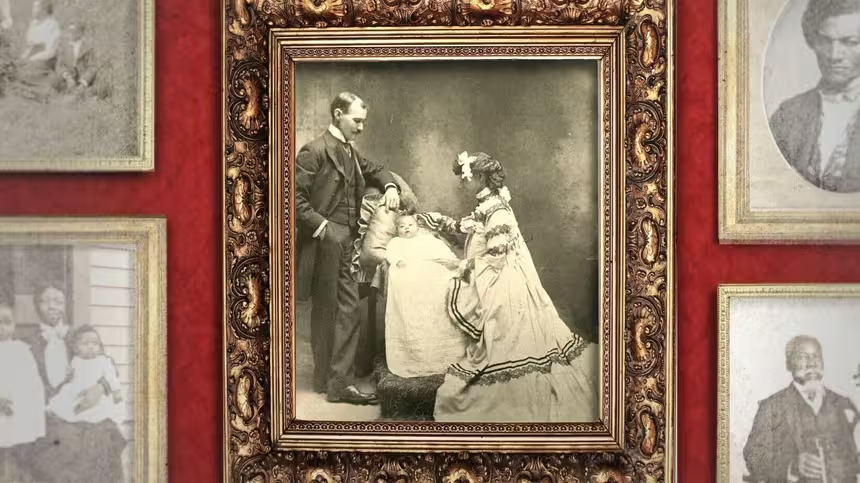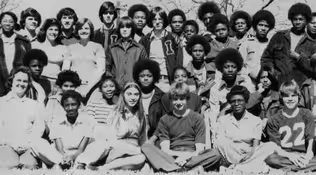
Chapter 1 | The Harvest: Integrating Mississippi's Schools
Clip: Season 35 Episode 8 | 12m 45sVideo has Closed Captions
Watch a preview of The Harvest: Integrating Mississippi's Schools.
Watch a preview of The Harvest: Integrating Mississippi's Schools.
Problems playing video? | Closed Captioning Feedback
Problems playing video? | Closed Captioning Feedback
Corporate sponsorship for American Experience is provided by Liberty Mutual Insurance and Carlisle Companies. Major funding by the Alfred P. Sloan Foundation.

Chapter 1 | The Harvest: Integrating Mississippi's Schools
Clip: Season 35 Episode 8 | 12m 45sVideo has Closed Captions
Watch a preview of The Harvest: Integrating Mississippi's Schools.
Problems playing video? | Closed Captioning Feedback
How to Watch American Experience
American Experience is available to stream on pbs.org and the free PBS App, available on iPhone, Apple TV, Android TV, Android smartphones, Amazon Fire TV, Amazon Fire Tablet, Roku, Samsung Smart TV, and Vizio.
Buy Now

When is a photo an act of resistance?
For families that just decades earlier were torn apart by chattel slavery, being photographed together was proof of their resilience.Providing Support for PBS.org
Learn Moreabout PBS online sponsorship♪ ♪ SARAH BLACKMON: You have one shot at raising your children.
You don't get do-overs.
We were very, very concerned that our children get a good education.
♪ ♪ JOHN MCCANDLISH: Growing up in Leland and thinking about where I lived, it seems somewhat like a Mayberry to me.
It was a very tight-knit community.
People knew each other.
People really cared about each other.
KEVIN MAGEE: I grew up kind of a latchkey kid and had the run of the town, basically.
I felt like, growing up, that the whole thing belonged to me, and I could go anywhere and do just about anything that I could get away with.
BRANDON TAYLOR: Certain places, you know, we couldn't, you know, we couldn't visit.
I mean, just like these park benches, you know.
This park was off, off-limits, you know, to Blacks.
♪ ♪ EVELYN GORDON-MURRAY: Leland was divided.
You had Black Dog, where I grew up, and you had the white section.
(insects chirping) VAN POINDEXTER: There was always a railroad track.
There was always a creek.
There was always a road.
There was always some marker that divided the neighborhoods.
DOUGLAS BLACKMON: In 1969, my hometown of Leland, Mississippi, finally had to reckon with something it had been avoiding for years.
ROGER MUDD: In 1954, the Supreme Court made school integration the law of the land, a law to be implemented with all deliberate speed.
Last fall, the court ruled that after 15 years, deliberation should end, and speed meant now.
JOHN BELL WILLIAMS: The quality of public education in a great portion of our state has been made an impossibility under conditions inflicted on our public schools by a vindictive, autocratic, arbitrary Supreme Court.
All Blacks that was involved was nervous about it, because we didn't know what was going to happen next, but we were still trying to do what we felt like was right.
The only thing I can see this leading to is the destruction of our school system.
The Negro children, on a whole, are further behind in their studies than our children.
MAN: We've got a psychology running in this state which is very deeply negative about the possibilities of Black and white working this thing out together.
Because of it, we've managed to stay 50th or 48th for a mighty long time, while we're so busy holding one down and keeping the other just on top.
REPORTER: What are your thoughts about going to school with about half and half white and Black students?
I don't care.
I mean, you know, the same people.
I think we all should be together.
And I hope that we could get along together.
DOUGLAS BLACKMON: My class was the first in Mississippi to have Black kids and white kids in school together from the first day of first grade to high school graduation.
We were supposed to be the seeds of a great harvest of racial harmony.
Three decades later, I needed to understand what happened, and why America is still so divided even after all we went through.
I went back to find out.
♪ ♪ ♪ You can't hurry God ♪ ♪ ♪ ♪ You got to wait ♪ ♪ ♪ ♪ Give him time ♪ ♪ ♪ ♪ He's a God ♪ ♪ You can't hurry ♪ ♪ He'll be there ♪ ♪ Don't you worry ♪ DOUGLAS BLACKMON: When I was a kid, my family lived in this little town in the Mississippi Delta called Leland, Mississippi.
SINGER: ♪ He's right on time ♪ DOUGLAS BLACKMON: If you have any vision in your mind of a cotton plantation in the Deep South, the place you are imagining is the Mississippi Delta.
♪ ♪ In the 1960s, Leland was still as harshly segregated as it ever was.
In those very early years, I just noticed that it was all white over here and all Black over there, and Black folks had more trouble than white folks.
And it perplexed me.
I started asking a lot of questions, which seemed uncomfortable to everybody I asked them to, including my parents at times.
And so, I couldn't make any sense out of it.
♪ ♪ Later, in middle school, I became aware of a place called Strike City.
Strike City was a settlement just outside of town, created in the middle of the 1960s after a group of Black tenant farmers went on strike.
JOHN HENRY SYLVESTER: The reason we went on strike, I was tired of working for six dollars a day, and I was tired of my wife and kids working for three dollars a day.
♪ ♪ DOUGLAS BLACKMON: They were among the very first African Americans in American history to rebel in this way against a white landowner.
There was a town oratorical contest sponsored by the Lions Club, and so I decide to write a speech about Strike City.
I went to the library, read stories that had been written in the local papers at the time.
I learned that the strikers were thrown out of their homes, they were attacked by the Ku Klux Klan, the men are blackballed from employment.
None of the men ever work again.
All kinds of terrible experiences.
So my little boy essay maps all this out, and at the end says, "Martin Luther King came along, and the Civil Rights Movement solved everything."
That was the conclusion.
(laughs) And so, the day of the contest, I go in.
And, of course, it's a room of about 45 middle-aged white men.
♪ ♪ The other students give their speeches, and then I get up and give my speech about Strike City.
And immediately, as soon as I start speaking, I realize that something, something's wrong.
As soon as I mention Strike City, the men in the room begin to snicker.
I was so confused.
Then as I proceed through the speech, and talk about the courage of the strikers, they go dead silent.
When I get to the part about the Ku Klux Klan attacking them, there's no response whatsoever.
I don't win the contest, naturally.
Then afterwards, all the men file by and shake our hands.
But this one fellow stands back, and waits till the others are gone.
And then he comes up to me, and he attacks.
"Who told you all those things, boy?
"Where did you get all that stuff, boy?
Nothing like that happened."
You know, "Did your momma and daddy tell you all that stuff?"
"They," you know, "They fillin' your head with lies."
And he gets louder and louder, and I stood there thinking, why is this happening?
Why is this man so angry at me?
And he's yelling and screaming.
Finally, my teacher comes over, bumps into the guy, and says, "What are you doing?"
And he spins around and takes off.
SINGER: ♪ He'll be there ♪ DOUGLAS BLACKMON: That was the beginning of my quest.
I became obsessed with trying to get to the bottom of, you know, why is this the way that things are?
SINGER: ♪ When you want him ♪ ♪ He's right on time ♪ ♪ ♪ (radio tuning) DOUGLAS BLACKMON: In 1967, my dad was finishing his Ph.D. and got a job at a research laboratory in the Mississippi Delta.
So my parents, two older brothers, and I moved from Baton Rouge, Louisiana, to Leland.
(radio tuning) I was three years old.
♪ ♪ For me, that's when this story began.
SARAH BLACKMON: We chose to live in Leland.
We liked that our children would be able to do things on their own, that they could ride their bicycles around town.
Uh, we, we liked the idea of a small town.
DOUGLAS BLACKMON: Leland was a busy, growing community in the 1960s.
The farm economy was strong, particularly for the people who owned large amounts of land.
Almost everyone made their living, one way or another, off the vast cotton and soybean fields that surrounded us.
(pipe organ playing, people singing) People came from far and wide at Christmas every year to see the decorations on the wide creek flowing through the center of town.
(marching band playing) Every fall, there was football and homecoming parades that wound through town and ended up on the field.
(band playing) Everyone seemed to agree that Leland was a special place, a little wealthier than most, better educated, more tolerant than other places nearby, and it did have a certain unique spirit.
(marching band continues) (crowd cheering and applauding) JAMES LACEY: At that time, Leland had an unusually good school system.
It was the pride of the community.
I grew up going to the Leland schools.
We rode school bus number 13.
(laughs) High school-- it was a really good time.
And there were 35 people, I think, in my graduating class in 1960.
(whistle blows, crowd cheering) ANNOUNCER: Fourth down coming up.
(crowd cheering) NEILL: Football was the big sport.
Everybody from town was at the game on Friday night.
Everybody rooted for the Cubs.
♪ ♪ It was a community-supported...
There again, in, in these terms of modern days, it was a white- community-supported, um, school.
♪ ♪ There was a team on the other side of town.
Gosh, I hate saying it this way.
(laughs) But that's the way it was.
I mean, that's the way we grew up.
♪ ♪ BILLY BARBER: Breisch High School was the high school for Black people and Black athletes in Leland, Mississippi.
You know, they did a good job.
They competed, they...
They, they played for titles.
We had one of the best basketball teams in the state.
Basketball, football, track.
We didn't have a gym.
We played on the bare ground outside.
We had a football field.
It wasn't, you know, with the bleachers and all, but you had a football field.
Oh, we had good, some great ballplayers.
Had some great ballplayers.
They would even have a crowd, a cheering crowd, a supportive crowd.
Loved the mascot.
We were the, the Braves.
The Breisch High Braves.
BARBER: You know, you take Breisch High and go back and check the history, they could compete with any team in the state of Mississippi.
♪ ♪
Trailer | The Harvest: Integrating Mississippi's Schools
Video has Closed Captions
Preview: S35 Ep8 | 1m 25s | The story of a Mississippi town’s effort to integrate its public schools in 1970. (1m 25s)
Providing Support for PBS.org
Learn Moreabout PBS online sponsorshipSupport for PBS provided by:
Corporate sponsorship for American Experience is provided by Liberty Mutual Insurance and Carlisle Companies. Major funding by the Alfred P. Sloan Foundation.


















